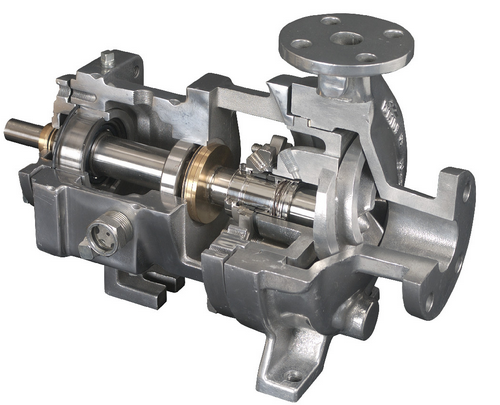Introduction to Chemical Process Pumps and Transportation Systems
1. Definition and Function
Chemical process pumps are important equipment used to transport various liquid media in the chemical production process. They have the characteristics of large power, high speed, small overall size, simple structure, and easy maintenance. Chemical process pumps are widely used in many fields such as oil refining, petrochemicals, coal processing and cryogenic engineering, papermaking, metallurgy, medicine, synthetic fibers, power generation, and environmental protection.
2. Types and Classifications
Chemical process pumps are of various types. According to their working principles, they can be divided into vane pumps (such as centrifugal pumps, axial flow pumps, mixed flow pumps, etc.), volumetric pumps (such as reciprocating pumps, screw pumps, etc.) and other types of pumps (such as high-pressure methylamine pumps, cryogenic pumps, etc.). Among them, the centrifugal pump is the most common type of chemical process pump. It generates centrifugal force through the rotation of the impeller, and throws the liquid from the center of the impeller to the edge, thereby realizing liquid transportation.
3. Structure and Features
Structure: Chemical process pumps usually adopt a single-stage single-suction cantilever structure, with a foot-supported pump body, a single-suction impeller, axial suction, and radial discharge. The axial force is hydraulically balanced through the front and rear rings and the balance hole. The shaft seal can be mechanically sealed or packed with a packing seal, and is equipped with a cooling, flushing or sealing liquid system.
Features:
Diverse conveying media: Chemical process pumps can convey clean or small-particle liquids, low-temperature, high-temperature, neutral, corrosive liquids, etc.
Wide performance range: Chemical process pumps have a wide performance range and are suitable for different flow rates, heads and media requirements.
Convenient maintenance: Due to the single-stage single-suction cantilever structure, the chemical process pump does not need to disassemble the suction and discharge pipelines during maintenance. After removing the pump cover, the suspension can be pulled out of the pump body together with the rotor components.
4. Material and corrosion resistance
The material selection of chemical process pumps is crucial to their corrosion resistance and service life. Commonly used materials include stainless steel, alloy steel, fluoroplastics, ceramics, etc. These materials have excellent corrosion resistance and can resist the erosion of various corrosive media.
Introduction to the conveying system
The conveying system refers to the general term for mechanical equipment and pipeline systems that transport materials from one location to another. In the chemical process, the conveying system plays a vital role, which ensures the smooth flow of raw materials, semi-finished products and finished products.
1. Types
There are many types of conveying systems, including belt conveyors, mesh belt conveyors, roller conveyors, steel belt conveyors, chain conveyors, chain plate conveyors, etc. Each type of conveying system has its specific scope of application and advantages and disadvantages.
2. Features
Continuity: The conveying system can continuously convey materials, improving production efficiency and automation level.
Adaptability: The conveying system can adapt to the conveying needs of materials of different shapes, sizes and weights, and has a wide range of applicability.
Flexibility: The conveying system can be flexibly laid out and adjusted according to production needs to meet different production process requirements.
3. Application in chemical processes
In the chemical process, the conveying system is widely used in the feeding of raw materials, the transportation of intermediate products and the packaging of finished products. Through the conveying system, materials can be conveyed quickly, accurately and safely, improving the efficiency and stability of the entire production process.





